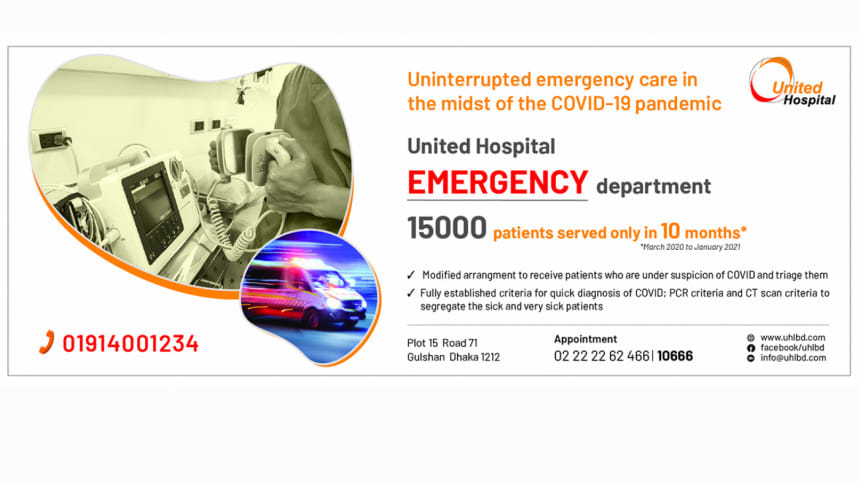Getting safe emergency care at United Hospital during the Covid-19 pandemic

Since March 2020, news about the coronavirus disease (Covid-19) pandemic has made many of us feel anxious about going to the emergency of a hospital or getting medical care, and we may have wondered if it is safe to go to the hospital. In the beginning, we found out that nearly 30% of people were avoiding or delaying medical care due to Covid-19 concerns. Emergency departments of some hospitals had about half their usual number of patients.
But it is important to seek emergency care if someone has serious non-Covid-19 or Covid-19 symptoms. Delaying care for a medical emergency, such as a heart attack or stroke, can be life-threatening or lead to severe complications.
"Don't let concerns about the coronavirus keep you from seeking the care you need. Get aware of the facts on the steps hospitals and emergency departments are taking to keep you safe", says Dr. GWM Zahidul Hasan, Specialist of United Hospital Emergency Department. Worrying about chances of catching the Covid-19 virus in the emergency department or in the hospital is natural especially if one needs to be admitted. So, it is always important to find out when one should go to the hospital emergency, and learn what hospitals are doing to keep their patients safe from getting the Covid-19 virus.
United Hospital and its emergency department as a whole took precautions to prevent the spread of the Covid-19 virus and help make sure that visits to the ED and hospital are as safe as possible, following strict guidelines for protecting people during the Covid-19 pandemic. These included universal masking requiring that everyone wears a face mask; screening at all entrances for Covid-19 signs and symptoms; separate waiting areas for people who have or may have Covid-19 in designated areas of the ED away from those who don't have Covid-19 signs and symptoms; frequent cleaning and disinfecting of ED waiting areas, rooms, restrooms and surfaces to accommodate updated Covid-19 hospital cleaning protocols and social distancing in check-in and waiting areas in Emergency Department and as a whole in the hospital.
At United Hospital, robust communication was established with patients by guiding them to wear a face mask, avoid touching eyes, nose or mouth, keep a social distance of 6 feet (2 meters) from other people and clean hands often, especially after touching any surfaces. Patients were advised to seek care immediately if they have or may have Covid-19 and experience any of the emergency signs or symptoms like troubled breathing, persistent chest pain or pressure, inability to stay awake, new confusion and even blue lips or face due to oxygen insufficiency.
Emergency preparedness is key when responding to any health crisis, and it refers to the knowledge and capacity to effectively anticipate, respond to, and recover from the impacts of a likely or current crisis. United Hospital health care workers—emergency doctors and nurses in particular—played an important role during the Covid-19 pandemic.
Preparedness of United Hospital Emergency Department during the Coronavirus Disease outbreak depended on organizational preparedness, personal preparedness, patient and family preparedness, along with challenges. At United Hospital, the trusted organizational leadership guaranteed organizational preparedness, and the active cooperation from patients and families was a motivator for personal preparedness. The Emergency Department had the biggest concentration of patients in critical condition, the most complex types of diseases, and the heaviest task of rescue and management. Generally speaking, patients who came for diagnosis were in severe condition and needed timely treatment. During the Covid-19 outbreak, Covid-19 screening became the priority. The challenge we faced and are facing today is how to screen rapidly and treat patients with no delay.
At United Hospital emergency room, doctors evaluate patients' symptoms, and they may perform blood tests and X-rays. They determine whether to test the patient for the Covid-19 virus. If the patient's condition is serious, he may be admitted to the hospital. The medical staff makes sure to wear personal protective equipment, including masks and eye protection when caring for the patient.
Clear guidelines on coordinating resources across departments also helped improve pandemic preparedness and responses at United Hospital. Relevant departments of the hospital strengthened training and professional knowledge to improve the medical staff's ability to diagnose and treat these patients; especially for the rapid diagnosis and treatment of patients with fever in critical condition.
Regarding organisational preparedness, United Hospital was fully prepared to respond to the Covid-19 outbreak at the Emergency Department, including the timely adjustment of departmental functions, strengthening of multidisciplinary cooperation, timely updating workflows, and timely provision of adequate protective medical supplies. As a consequence of these measures, the emergency department doctors and nurses trusted the organization to protect them, which prompted an increased willingness to work during the Covid-19 pandemic; positive occupational preparedness was associated with their willingness to remain vigilant and on duty during this pandemic. Doctors and nurses had positive personal preparedness for dealing with Covid-19, by actively seeking knowledge and active communication with patients and their families. Their adjustment of self-psychology when feeling stressed by the pressure of dealing with the epidemic; indicated that their professional responsibility was related to their willingness to work. Caregivers at United Hospital were committed to working during the Covid-19 pandemic owing to their professional responsibility even when fearing infection or the transmission of the infection to their families.
Moreover, patients and their families also cooperated actively during the Covid-19 outbreak, which made United Hospital Emergency Department caregivers feel understood, respected, recognized and supported. "Support from patients and society provided encouragement for our emergency doctors and nurses to actively prepare to overcome difficulties and challenges at work during the Covid-19 pandemic", says Dr Zahid, Specialist of United Hospital Emergency Department.

 For all latest news, follow The Daily Star's Google News channel.
For all latest news, follow The Daily Star's Google News channel. 



Comments